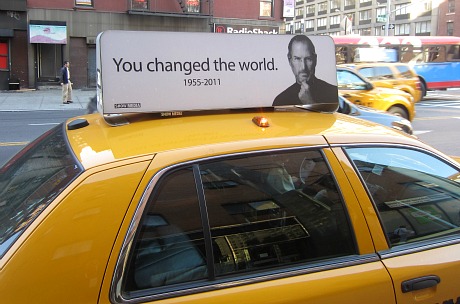As much as I admire and respect Michael Fassbender‘s sex-addict performance in Shame, I don’t think he has a chance in hell of getting any Best Actor action from it. He’s playing an ice man who’s too remote, too indecipherable. Ditto his performance as Carl Jung in A Dangerous Method. The 2011 Fassbender performance that got to me the most? That I found emotionally whole and affecting and quite supple? His performance as Rochester in Cary Fukanaga‘s Jane Eyre. But no one’s paying attention to that one so I suppose that means “game over” for the guy. Or does it?
Daily
Old Enough To Love
The central dramatic element in The Swell Season, a nicely captured black-and-white doc about how Glen Hansard and Marketa Irglova coped with the success of Once, is, of course, the breakup of their romantic relationship. And the big torpedo, boiled down, is Irglova’s inability to deal with the hooplah, which is due to her being too young.
This is almost completely typical. Whenever an under-25 performer suddenly hits it big, they tend to withdraw from the resulting attention, and then rebel against it in this or that way. Leonardo DiCaprio seemed to more or less freak out in the wake of Titanic‘s success, and didn’t really ease back into things until two or three years later. So the 20 year-old Irglova being unable to roll with being a sudden “star” fits right into this.
Hansard, on the other hand, is totally cool with backstage admirers, and gradually starts shaking his head at Irglova’s hissy fits. And you can see where it’s all heading.
So what the film boils down to is a portrait of a once-beautiful relationship (as depicted in Once, at least) that was probably doomed to start because of age disparity. Hansard is now 41; Irglova was 19 when Once was made, and 20 when the big success happened. They were toast as of 2009. Irglova got married last June to Tim Iseler, a studio engineer.
Otherwise the doc, co-directed by Nick August-Perna, Chris Dapkins and Carlo Mirabella-Davis, is an engrossing portrait of the musical performing world, and is very nicely captured in black-and-white.
Harvey Chronicles
The narration’s boastful tone towards the end of this trailer for Barry Avrich ‘s Unauthorized: The Harvey Weinstein Project has me concerned. There’s a great documentary to be made about Weinstein, whom I’ve always seen as a scrappy East Coast mogul in the tradition of The Bad and the Beautiful‘s Jonathan Shields (as played by Kirk Douglas). A little voice is telling me that Avrich’s film, which opened online yesterday via Sundancenow, might not be it.
Has anyone seen it? I’ll try to catch it sometime this weekend.
The Bull Won For A Change
Bullfighter Juan Jose Padilla was badly gored in the face last night by a bull named Marques. To which I say “tough tits.” I have no sympathy at all for a costumed sadist who gets hurt while acting out a ritual in which a poor dumb animal is ritualistically taunted and then speared to death for the delight of spectators. The altercation happened in a bullfight that was part of the annual Virgen del Pilar festivities in Zaragoza, Spain.

Colman Investment Fund
A journalist friend said something yesterday that’s stayed with me. We both agreed that in a perfect world Olivia Colman‘s performance in Tyrannosaur would easily place her among the very top contenders for the Best Actress Oscar. But she hasn’t got a chance, my friend said, because Strand Releasing, Tyrannosaur‘s U.S. distributor, apparently has no mad money to spend on her campaign. And without ample funds there can’t be any kind of press tour, trade ads, special industry screenings and food-and-drink events in Los Angeles and New York.
So this is the reality then. Your motion-picture performance might be devasating…it might soar higher or reach deeper than any other seen in any category in a given year, but if you can’t come up with serious cash and fly Virgin and belly up to the bar and do interviews in a plush Manhattan midtown or Beverly Hills hotel and throw parties that Academy members can attend or at least luncheons for elite New York and L.A. journos then your performance, no matter how great or staggering, might as well have been given in a closet. Because “they” won’t take notice if you don’t. And that stinks. That really stinks.
Maybe it’s wiser to urge support for Colman as a Best Supporting Actress contender. That could easily be finessed as her role as an abused wife in Tyrannosaur isn’t an absolute lead. The lesson of Another Year‘s Lesley Manville, which I presume I don’t have to explain, should be kept in mind.
Out There
Congratulations offered to DreamWorks/Disney, Hugh Jackman, Angry Films’ Don Murphy and Real Steel for more than doubling the weekend tally of George Clooney‘s The Ides of March (even though the latter is in 2199 theatres compared to Steel‘s 3440) and taking the weekend’s top slot with a projected $27 million.
Ides, far and away the better film, will end up at #2 with something like $11 million. I don’t want to know about the third-place Dolphin Tale, which will end up doing around $8.5 million by Sunday night for a $48 million tally. And it’s the third weekend for the fourth-place Moneyball, hangin’ in there with a projected/estimated $7 million or thereabouts and a cume of $48.7 million. (Figures from Deadline.)
Albino Eyebrows
I don’t recall a single moment in any of the three Danish-made Girl movies in which Noomi Rapace conveyed this level of vulnerabiity. And I don’t know if this kind of emotionality is in Rooney Mara‘s performance in David Fincher‘s The Girl With The Dragon Tattoo either. The pic was shot by Jean-Baptiste Mondino for Le Monde.

What’s that white-gray stuff on her face and hair? Volcanic ash?
Hugo “Made For Cineastes”
A guy who read my earlier Hugo post and who definitely writes well has conveyed the following: “I saw Martin Scorsese‘s Hugo at a Chicago test screening in mid-September. Some comments on your posted expectations”:
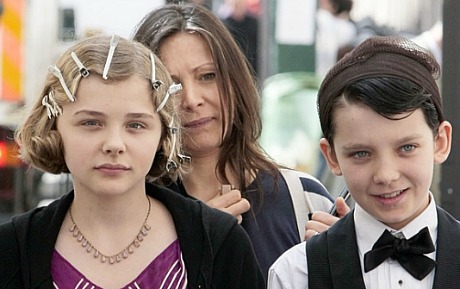
1. “Scorsese’s 3D work will be ’50s-style, I’m expecting. Lots of House of Wax-y pop-out shots.”
Chicago comment: “Not at all. Lots of wide-angle and tracking shots. In fact, there’s one tracking shot in the opening 10 minutes that outdoes the Copa shot in Goodfellas in terms of sheer technical razzle-dazzle — it follows Hugo across and around catwalks, down a ladder, around a spiral slide, through walls, etc. ¬†It doesn’t have the same narrative effect as the Copa shot, but it left my jaw the floor.
“The most consistently impressive aspect of the 3D is actually the particulate matter Scorsese adds to all the shots in the train station — amber-hued dust, snow, seta, etc.
“Also, much of the aesthetic is rooted in the wide proscenium framings of silent cinema. This makes a lot of narrative sense once the ‘secret’ of the film is revealed.
2. “And it may be a highly satisfying film in this or that way, but this is one of Scorsese’s experiments.”
Chicago comment: “Nope. I actually think it may be his most ‘personal’ film since…I don’t know, Goodfellas? Without spoiling too much, all the people who know Scorsese are going to be writing about how this is really about him and Thelma Schoonmacher rediscovering Michael Powell in the ’70s and their efforts to restore his reputation. I shit you not — the last act is all about the importance of film preservation.
“And that’s before you throw in all the stuff about an outcast kid who watches the world from his window (i.e., Scorsese growing up), trying to avoid getting hit by the local enforcement (Sasha Baron Cohen = the mob, etc.)
“Does it work? To a point. Before I saw it, I was willing to write this off as an experiment as well, but it’s obvious Scorsese put some heart and soul into this. But you’re right — ‘heart’ isn’t really in Scorsese’s wheelhouse.
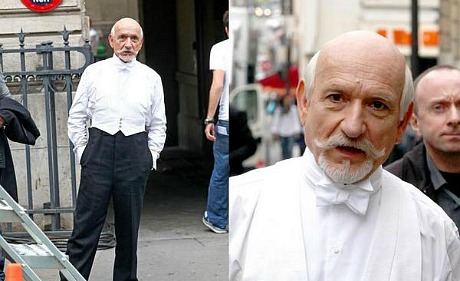
Ben Kingsley as he appears in Hugo.
3, “Scorsese doesn’t do kid-friendly or family-friendly.”
Chicago comment: “You’re right. But contrary to the trailer’s portrayal, this isn’t really a kid movie. Frankly, I think kids’ll be bored with it. It’s a movie made for cineastes.
“The kids are fine (Asa Butterfield is a little stilted), but the showcase performance here is Ben Kingsley‘s.
“It makes sense that they’re screening this early. If they try to sell this directly to families, it’s going to tank. They really need to get the erudite snobs talking about this one. Unfortunately, The Artist may have the stolen the old-school cineaste cache this might have had.”
Note: Obviously those stupid A’s are contained in the characters of the original e-mail, but damned if I can figure how to get rid of them short of re-typing the whole thing.
Not So Bad
I’ve been 80% to 85% persuaded by an unnamed source that Monday’s New York Film Festival screening of “a work-in-progress from a master filmmaker” will be Martin Scorsese‘s Hugo (Paramount, 11.23). I won’t attend due to travel plans that can’t be changed, but if my source is correct, I can live with missing this screening. I’ll see it soon enough. It’s okay.
I’ll feel shattered if the sneak turns out to be The Girl With The Dragon Tattoo or J. Edgar even, but…we’ll obviously know soon enough.
Scorsese’s 3D work will be ’50s-style, I’m expecting. Lots of House of Wax-y pop-out shots. And it may be a highly satisfying film in this or that way, but this is one of his experiments. He doesn’t do kid-friendly or family-friendly. When did he last deal with a really young character or two? Alice Doesn’t Live Here Anymore? Not his wheelhouse.
Krugman Lauds Occupy-ers
In his 10.7 column, N.Y. Times columnist Paul Krugman has offered some of the most sensible thoughts I’ve heard from a boomer-aged pundit about the various Occupy happenings: “There’s something happening here. What it is ain’t exactly clear, but we may, at long last, be seeing the rise of a popular movement that, unlike the Tea Party, is angry at the right people.
“When the Occupy Wall Street protests began three weeks ago, most news organizations were derisive if they deigned to mention the events at all. For example, nine days into the protests, National Public Radio had provided no coverage whatsoever.
“It is, therefore, a testament to the passion of those involved that the protests not only continued but grew, eventually becoming too big to ignore. With unions and a growing number of Democrats now expressing at least qualified support for the protesters, Occupy Wall Street is starting to look like an important event that might even eventually be seen as a turning point.
“What can we say about the protests? First things first: The protesters’ indictment of Wall Street as a destructive force, economically and politically, is completely right.
“A weary cynicism, a belief that justice will never get served, has taken over much of our political debate — and, yes, I myself have sometimes succumbed. In the process, it has been easy to forget just how outrageous the story of our economic woes really is. So, in case you’ve forgotten, it was a play in three acts.
“In the first act, bankers took advantage of deregulation to run wild (and pay themselves princely sums), inflating huge bubbles through reckless lending. In the second act, the bubbles burst — but bankers were bailed out by taxpayers, with remarkably few strings attached, even as ordinary workers continued to suffer the consequences of the bankers’ sins. And, in the third act, bankers showed their gratitude by turning on the people who had saved them, throwing their support — and the wealth they still possessed thanks to the bailouts — behind politicians who promised to keep their taxes low and dismantle the mild regulations erected in the aftermath of the crisis.
“Given this history, how can you not applaud the protesters for finally taking a stand?
“Now, it’s true that some of the protesters are oddly dressed or have silly-sounding slogans, which is inevitable given the open character of the events. But so what? I, at least, am a lot more offended by the sight of exquisitely tailored plutocrats, who owe their continued wealth to government guarantees, whining that President Obama has said mean things about them than I am by the sight of ragtag young people denouncing consumerism.”
Sharp Tongue, Incisive Mind
Before reading Todd McCarthy‘s 10.6 review of Brian Kellow‘s “Pauline Kael: A Life in the Dark“, I’d never heard about the legendary New Yorker film critic having allegedly hastened the death of director Roberto Rossellini by inflicting stress on the poor man. During their mutual service on the 1977 Cannes Film Festival jury, McCarthy writes, Kael “argued so relentlessly with the aging and ailing Rossellini for two weeks that the uncharitable accused her of killing the revered director, who died the following week.”
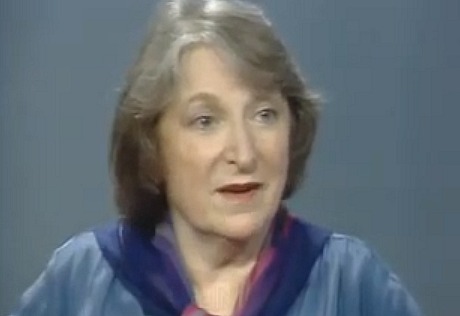
New Yorker critic Pauline Kael during a 1982 interview, when she was 62 or 63.
On the other hand McCarthy recounts a passage in Kellow’s book in which Kael and director George Roy Hill, “both terribly debilitated by Parkinson’s disease, met by chance in a small-town Massachusetts restaurant. Their previous personal contact had been some 30 years earlier when the director, responding to her unkind and, in one respect, uninformed review of Butch Cassidy and the Sundance Kid, had begun with the salutation, ‘Listen, you miserable bitch.’ Ignoring this, ‘Pauline clutched his hand warmly and gave him the name of her massage therapist, promising him that the therapy would do him a world of good.'”
McCarthy also notes that Kael “was always surprised when ‘friends’ she went on to attack in print — Woody Allen, for example — took offense at her criticism, as she somehow imagined they would understand it wasn’t personal, that she had to be completely honest in her reviews.”
Hah! From the filmmakers’ point of view, a critic or columnist they personally know is their friend and supporter no matter what, a writer who will always be generous or at least cut them a break whenever possible, or they’re some kind of enemy or betrayer or backbiter if they write something even moderately critical, especially if it strikes the filmmaker as dismissive.
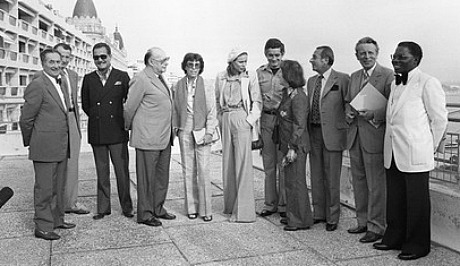
The 1977 Cannes Film Festival jury (i.e., Kael is the shortest, fourth from right)

